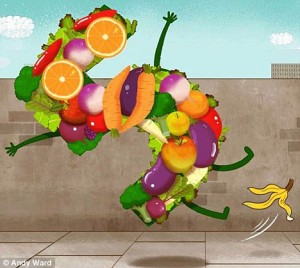The organic food industry has, in the last decade, exploded beyond all sensible proportion so that now, worldwide, the industry is worth roughly $65 billion dollars.
Astonishing as that figure is, though, it becomes all the more so when you realize that this entire industry is predicated upon one giant myth after another.
In March of 2010, for instance, I wrote about a Los Angeles Times article that said, among other things:
Since 1989, when organic-food activists raised a [bunked] nationwide scare over the pesticide alar in apples, many scientists have seethed quietly at what they perceive as a campaign of scare tactics, innuendo and shoddy science perpetrated by organic food producers and their allies.
Indeed, organic food activists are increasingly open about their specific agenda. Organic Valley Marketing Director Theresa Marquez, for instance, laid out, in no uncertain terms, her strategy of falsifying data to dupe the masses into thinking organics are worth their premium price:
“We think it’s important that people pay more for food,” she said. “The question is: ‘Will consumers pay more for that?’ and ‘How can we convince them to do that?’”
And yet: “Organic food has no higher nutritional value compared to conventional food,” says Nutrition and Diet Professor Tom Sanders, of Kings College London.
Despite the fact that this information is widely known and readily available, the organic food cult continues to grow.
Here are three of the biggest myths concerning organic foods:
Myth Number 3: Organic Foods are Healthier
There has never been one legitimate study that has confirmed this, and two of the most recent and systematic studies, one from Stanford University and the other from the United Kingdom, said, in no uncertain terms, the diametric opposite:
“There is no evidence that organic foods are more nutritious or lead to better health-related outcomes for consumers” (source).
Myth Number 2: Organic Foods are Better for the Planet
The very word “organic” has been commandeered by a great many quacks and phonies, so that the term, which was once legitimate, has now become a conceptual void. Quoting the erudite R.I. Throckmorton, Dean of Kansas State Agricultural College, who does not like the organic craze:
This cult has sought to appropriate a good word — ‘organic’ — and has twisted its meaning to cover a whole crazy doctrine. The facts are that organic matter in its true sense IS an important component of the soil — but soil fertility and the kind of crops you grow on a soil are not determined by humus alone. Soil fertility is determined by the amount of active organic matter, the amount of available mineral nutrients, the activities of soil organisms, chemical activities in the soil solution and the physical condition of the soil. Ever since we have had soil scientists, they have recognized the values of organic matter. The loss of soil humus through cultivation has long been a matter of concern. So the faddists have nothing new to offer on that score.
Organic matter is often called ‘the life of the soil’ because it supplies most of the food needs of the soil organisms which aid in changing nonavailable plant food materials into forms-that are available to the plants, and contains small quantities of practically all plant nutrients…. The antichemical-fertilizer doctrine makes a great point of the fact that plant food in organic matter is in a ‘natural’ form, while in chemical form fertilizer it is ‘unnatural’ and thus supposedly is harmful, if not downright poisonous. The logic of this escapes me. Science completely disproved the conclusion.
The facts are that any plant foods, whether from organic matter, or from a bag of commercial fertilizer, necessarily came from Nature in the first place. Why is one more ‘natural’ than another? A Plant takes in a given nutrient in the same chemical form whether it came from organic matter, or from a bag of commercial fertilizer. The facts are that practically all plant-food elements carried by organic matter are not used in their organic form; they are changed by microorganisms to the simple chemical forms which the plants can use — the same form in which these elements become available to plants when applied as chemical fertilizers. For example, it is foolish to say that nitrogen in commercial fertilizer is “poisonous” while nitrogen from organic matter is beneficial. The basic nitrogen is the same in either case (“The Organic Farming Myths,” R.I. Throckmorton).
Muck soil, as it’s called, holds as much as 50 percent organic matter — “organic” in the real sense of the word — and yet, according to organic pseudoscience, ‘You could do little to improve such soils.’
Commenting on the extensive report on his popular podcast, The Skeptics’ Guide to the Universe, Novella had some blunt words for the organic industry.
“People buy organic because they think it’s better for the environment; it’s not. It’s safer; it’s not. It tastes better; it doesn’t. It’s more nutritious; it isn’t. And these are all misconceptions that have been deliberately promoted — according to these authors — by organic farmers and organic proponents despite the fact that scientific evidence doesn’t support any of these claims.”
Myth Number 1: Organic Foods Don’t Use Pesticides
This is the most widespread myth of them all. In fact, a recent poll found that 69% of consumers believe it to be true that organic foods (so-called) don’t use pesticides. “Among those who regularly purchase organic food, the notion is even more prevalent. A survey from the Soil Association found that as many as 95% of organic consumers in the UK buy organic to ‘avoid pesticides.'”
But organic farms and farmers do use pesticides — perforce. The only difference is that those pesticides aren’t synthetic. That may sound like a major advantage, but in fact it is not. Just the opposite:
“A pesticide, whether it’s natural or not, is a chemical with the purpose of killing insects (or warding off animals, or destroying weeds, or mitigating any other kind of pest, as our watchful commenters have correctly pointed out). Sadly, however, “natural” pesticides aren’t as effective, so organic farmers actually end up using more of them!
“Moreover, we actually know less about the effects of ‘natural’ pesticides. Conventional ‘synthetic’ pesticides are highly regulated and have been for some time. We know that any remaining pesticide residues on both conventional and organic produce aren’t harmful to consumers. But, writes agricultural technologist Steve Savage, ‘we still have no real data about the most likely pesticide residues that occur on organic crops and we are unlikely to get any.’
“Scientists can examine pesticides before they are sprayed on fields, however. And what do these analyses show?
“‘Organic pesticides that are studied have been found to be as toxic as synthetic pesticides,’ Steven Novella, president and co-founder of the New England Skeptical Society, recently wrote.
“Organic foods are no safer than conventional foods. Even Katherine DiMatteo, executive director of the Organic Trade Association (OTA), recognizes this as fact. An “organic label does not promise a necessarily safer product,” she once remarked.
(Hat tip: RealClearScience)


